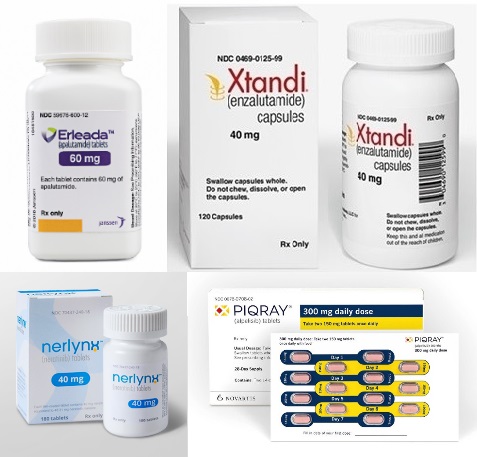Janssen’s Erleada (apalutamide) and Astellas’ Xtandi (enzalutamide) passed the review of the Cancer Drugs Benefit Appraisal Committee for health insurance benefits as combination therapy with androgen deprivation therapy (ADT) to treat metastatic hormone-sensitive prostate cancer (mHSPC).
In contrast, Bixink’s Nerlynx (neratinib) and Novartis’ Piqray (alpelisib) failed to pass the review.
The Health Insurance Review and Assessment Service (HIRA) released the results of the cancer drugs benefit appraisal committee’s deliberation on Wednesday.

The review results were based on study data.
Recently, researchers announced that using an androgen receptor-targeted agent (ARTA) in combination with the standard treatment ADT proved overall survival benefits in mHSPC.
In the phase 3 TITAN study of Erleada in 1,052 patients, the overall survival (OS) did not reach the median at the data cut-off. In the placebo group, the median OS was 52.2 months, meaning that the addition of Erleada to ADT reduced the risk of death by 35 percent, compared to ADT alone.
Xtandi also proved a 34 percent reduction effect, compared to ADT alone, in death risk in the phase 3 ARCHES trial in 1,150 patients.
These two studies demonstrated OS benefits even though cross-administration was allowed for the placebo group after unblinding.
However, the breast cancer drug Piqray (alpelisib) failed to pass the reimbursement review because of phase 3 SOLAR-1 study design.
While Piqray proved the second-line therapeutic effect in metastatic hormone receptor-positive breast cancer in SOLAR-1, a CDK4/6 inhibitor became the first-line standard therapy.
So, Novartis conducted a phase 2 BYLieve trial and derived positive data in PIK3CA mutation patients whose tumor has progressed after CDK4/6 inhibitor plus aromatase inhibitor (AI) combo therapy.
However, observers said that the lack of the phase 3 study that includes the standard therapy could negatively affect the HIRA panel’s review.
Nerlynx, adjuvant therapy for early breast cancer introduced by Korean company Bixink, demonstrated the effect of delaying recurrence in patients with HER2-positive early breast cancer through the phase 3 ExteNET study.
However, several years before the arrival of Nerlynx, Roche’s Perjeta (pertuzumab) and Kadcyla (trastuzumab emtansine), approved for adjuvant therapy before and after surgery for HER2 positive early breast cancer, are already selectively reimbursable or non-reimbursable. So, it is not easy for latecomer adjuvant therapy to obtain marketing approval and reimbursement simultaneously.
Bixink emphasizes Nerlynx’s prevention of brain metastasis as a small molecule drug, compared to Perjeta and Kadcyla.
However, considering Perjeta, the standard treatment for advanced chemotherapy, is being used with 30 percent selective reimbursement, it may take longer for Nerlynx to win insurance benefits.

